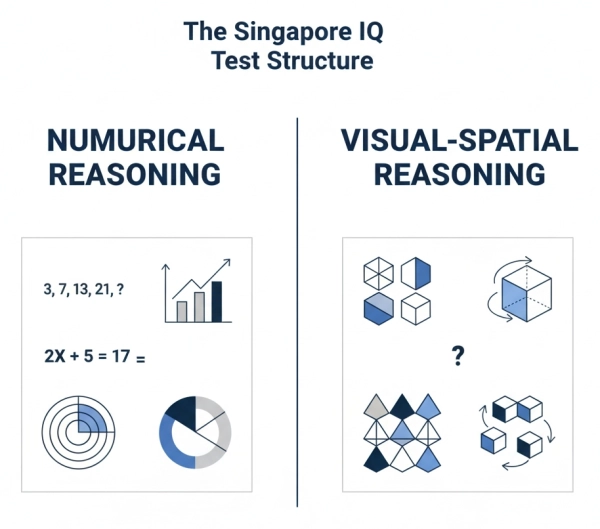The Singapore IQ Test isn’t your average brain teaser. It’s a highly respected, university-grade intelligence assessment that evaluates not just how smart you are—but how fast and flexibly your brain works under intense cognitive pressure. For readers unfamiliar with modern intelligence testing, you can learn more about the fundamentals in this guide on the different types of IQ tests used today.
Developed and refined for elite academic settings in Singapore, this test has become a new global standard for measuring practical intelligence across two domains: numerical logic and visual reasoning.
Let’s break it down.

A Unique Origin – Academic Precision from Southeast Asia
Unlike traditional IQ assessments developed in Western psychology—such as the Stanford–Binet or the WAIS—the Singapore IQ Test emerges from a very different educational philosophy. Its foundations reflect the academic intensity, competitive culture, and analytical expectations common across Southeast Asia, particularly within Singapore’s globally respected school system.
Singapore is known for producing some of the strongest math, science, and engineering performers in the world. The country consistently ranks at the top of international assessments like PISA and TIMSS. Because of this, the test draws inspiration from real entrance exams used by top-tier Singaporean universities, especially in disciplines that rely heavily on structured thinking:
- Engineering and applied sciences
- Information technology, AI, and computer science
- Economics, finance, and quantitative programmes
If you're curious how Singapore’s approach compares globally, you can explore a related analysis in Singapore IQ Test vs other global intelligence tests.
Rather than relying on abstract psychological theories alone, the Singapore IQ Test is built around cognitive realism—the idea that intelligence should be evaluated in conditions that mirror high-pressure problem-solving in the real world. This philosophy aligns with modern research on cognitive flexibility, explored in the article on what cognitive flexibility really is.
Core Structure – What’s Actually Inside the Test?

The assessment is designed to evaluate both speed and accuracy, condensing complex reasoning into a fast-paced format. It includes:
- 32 strictly timed questions
- 20 minutes total duration
- Two core cognitive domains
1. Numerical Reasoning
This section measures rapid numerical interpretation and number-pattern manipulation. These abilities closely relate to analytical traits discussed in the article What Is Cognitive Benchmarking?.
Tasks include:
- Identifying number patterns and hidden rules
- Solving mental arithmetic without a calculator
- Understanding proportional relationships
- Recognizing logical progressions in sequences
These questions mimic the cognitive load found in technical work—coding logic, financial modelling, or data-driven decision-making.
2. Visual–Spatial Reasoning
Here, the test evaluates non-verbal intelligence and spatial awareness:
- Symmetry analysis
- Rotational and spatial orientation
- Abstract pattern recognition
- Visual sequencing and logic
This type of reasoning is essential for engineering, design, architecture, and any role requiring complex problem decomposition.
To understand how visual reasoning connects to broader intelligence frameworks, you may also like the deep dive into verbal vs non-verbal intelligence tests.
3. A Test of Stamina and Mental Sharpness
With just 20 minutes to complete 32 items, test-takers have roughly 37 seconds per question—barely enough time to overthink. The difficulty increases steadily, meaning your brain must switch between fast, intuitive reasoning and deeper analytical thought without losing momentum.
Most people break not due to lack of intelligence, but due to the relentless time pressure, which exposes gaps in focus, mental endurance, and cognitive flexibility.
Why Is the Singapore IQ Test So Highly Regarded?
The test has gained respect across Asia—and increasingly worldwide—because of three defining advantages:
1. Time Pressure + Complexity
Traditional IQ tests, especially older Western models, allow more time per question, enabling test-takers to analyze calmly. The Singapore IQ Test intentionally removes that comfort zone. It simulates the kind of high-stakes environments found in:
- Competitive university entrance exams
- Technical job interviews
- Fast-paced corporate decision-making
You aren’t just solving a puzzle—you’re doing it under academic-level pressure.
This is why many people preparing for such environments also study materials like the Recruitment IQ Test.
2. Balanced Intelligence Profiling
Many tests subconsciously favour either numerical thinkers or visual-based problem solvers. This assessment requires success in both domains. To score well, you need:
- Analytical precision
- Pattern sensitivity
- Spatial awareness
- Rapid mental switching
It rewards balanced cognitive architecture, not one-dimensional brilliance.
3. Institutional Usage and Academic Validation
Some elite Singaporean universities and pre-university programmes integrate it (or variations of it) into their aptitude profiling. It’s especially valued in faculties with logic-heavy curricula, where intellectual speed and structured reasoning determine long-term student success.
This academic endorsement contributes significantly to its prestige—positioning the Singapore IQ Test as not just an online challenge, but a respected metric of analytical potential.
Real-World Application – Not Just a Game
Many high-level recruiters and academic programs are turning to tests like this because they measure more than just abstract intelligence. They measure:
- Cognitive speed
- Working memory capacity
- Stress tolerance under mental load
- Decision-making precision
If you want to understand how intelligence interacts with emotional factors, consider reading IQ vs EQ for a broader perspective.
Who Should Take the Singapore IQ Test?
This test is ideal for:
- University applicants aiming for STEM programs
- Professionals in data science, finance, or engineering
- Gifted individuals seeking membership in high-IQ societies
- Anyone who wants a serious, challenging IQ benchmark—not a casual quiz.
For children or teens, parents might instead consider the IQ Test for Kids, which measures age-appropriate cognitive abilities.
Bonus – Recognition for High Scorers
If you score 130 or above, you may qualify for:
- An invitation to Vietnam High Intelligence Organization
- Placement on the IQ Honor Board
- Access to Advanced High-Range IQ Tests, such as the High-Range IQ Test for the global top 2%.
If you're curious how scores compare, the breakdown of IQ 142 or IQ 150 offers valuable insight.

Conclusion – A Challenge Worth Accepting
The Singapore IQ Test isn’t just a number generator—it’s a modern, strategic intelligence gauntlet. For anyone aiming to validate their cognitive potential, benchmark themselves against top performers, or pursue high-IQ recognition, this test delivers a high-pressure, high-precision measurement of true analytical performance.
If you want to prepare more effectively, you might explore How to Prepare for the Singapore University IQ Test for structured guidance.

Comments
Share Your Thoughts